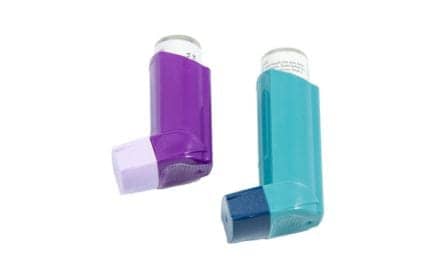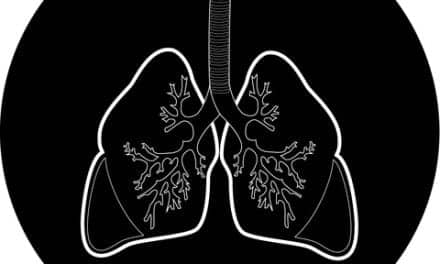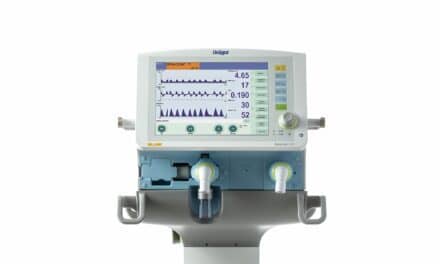GlaxoSmithKline and Innoviva Inc have released results of the Salford Lung Study (SLS) have been published in the New England Journal of Medicine (NEJM). This unique study, which reported headline results in May 2016, was designed to evaluate the effectiveness and safety of Relvar Ellipta in patients with COPD, compared with their ‘usual care’ administered in an everyday clinical practice setting. Data from the study are being presented at the European Respiratory Society (ERS) International Congress on Sunday September 4th in London, (abstract number OA249).
For the primary endpoint in patients, who had exacerbated in the year before the study, treated with Relvar Ellipta 100/25mcg (fluticasone furoate ‘FF’/vilanterol ‘VI’ or ‘FF/VI’) there was a statistically significant reduction of 8.4% (p=0.025; 95% CI 1.1 to 15.2) in the rate of moderate or severe exacerbations compared with patients receiving ‘usual care’. The majority of these patients in the study on usual care were taking an inhaled corticosteroid (ICS) containing regimen (88%). A similar reduction in exacerbations with FF/VI was seen in those patients on an ICS/long-acting beta2-agonist (LABA) at baseline (8.0%; 95% CI 0.11 to 15.4, p=0.047).
For the intent to treat (ITT) population there were no differences observed between FF/VI and usual care on secondary outcomes measured including the time to first moderate or severe exacerbation and rate of severe exacerbations, the rate of secondary care healthcare contacts and COPD related primary care contacts. There were more primary care contacts overall on FF/VI (12.3% increase, 95% CI 5.4 to19.6). The COPD Assessment Test (CAT), which measures the impact of disease on health status, demonstrated 45% of patients receiving FF/VI improved their CAT score by 2 or more, a clinically relevant improvement, compared to 36% in the usual care group (odds ratio 1.51, 95% CI, 1.28 to 1.77).
The incidence of serious adverse events (SAE) was similar between the groups (29% FF/VI, 27% usual care). For pneumonia, an SAE of special interest, FF/VI demonstrated non-inferiority (7% FF/VI vs 6% usual care). This endpoint was a post-authorisation measure requested by the European Medicines Agency (EMA).
Neil Barnes, Global Medical Head, Respiratory Franchise at GSK said: “In the SLS study we included a broad spectrum of patients who had minimal interventions to see if this would allow us to observe a difference between treatments. The results from SLS provide robust evidence that will enable the healthcare community to begin to understand how the choice of COPD treatment can significantly influence patient outcomes. We are continuing to analyse the data from the study as we know there is so much more we will learn and we look forward to sharing our findings in future publications. I want to thank all of the patients who participated and the partners who collaborated with GSK to make this unique study possible.”
Michael W. Aguiar, President and Chief Executive Officer of Innoviva said: “The data being presented at ERS and published in NEJM confirm the effectiveness of Relvar Ellipta compared with not only usual care, but also with those patients who were taking a different medicine in the same ICS/LABA class. These are important data to share with physicians, from a unique study carried out in conditions closely reflecting everyday clinical practice.”
The study was made possible through collaboration between GSK, North West e-Health (NWEH), The University of Manchester, Salford Royal NHS Foundation Trust, University Hospital of South Manchester (UHSM), NHS Salford and GPs and community pharmacists in Salford, Trafford and South Manchester.
A second Salford Lung Study is currently being conducted in patients with asthma, with results expected in 2017.
The Salford Lung Study is a Phase IIIb multi-centre, open label randomised controlled trial (RCT). The objective of the SLS COPD study was to compare the effectiveness and safety profile of FF/VI 100/25mcg with existing COPD usual care. All suitable patients with COPD at 80 primary care sites in and around Salford and South Manchester were identified from practice databases, and invited to participate in the study by their own GP.
In total, 2802 patients with COPD were randomised 1:1 to receive FF/VI 100/25mcg, with or without a long-acting muscarinic antagonists (LAMA), or to continue to receive usual care. FF/VI was administered once daily via the Ellipta inhaler. Patients who were taking a LAMA in addition to ICS/LABA therapy (triple therapy) who were randomised to the FF/VI group were able to continue to use LAMA therapy in addition to FF/VI. Usual care was taken as advised by the prescribing clinician, and could include single or dual long-acting bronchodilator therapy, inhaled corticosteroid either alone or in combination with a long acting bronchodilator or triple therapy of a LAMA, a LABA and an inhaled corticosteroid.
The Salford Lung Study had minimal exclusion criteria and involved a broad demographic of patients. Patients were followed for a period of 12 months in a normal clinical practice setting using a single electronic medical record (EMR), linking primary care (patients seen by their general practitioner), secondary care (patients seen in a hospital setting) and pharmacy data. Throughout the duration of the study physicians were allowed to modify or switch treatment at any point in the study, as would happen in normal clinical practice, the only exception being a switch from usual care to FF/VI.
The study team was able to monitor all hospital admissions, outpatient and emergency department visits, as well as data from primary care (including all healthcare contacts, out-of-hours activity and prescriptions of antibiotics or oral steroids) via the electronic health-records.
The primary effectiveness endpoint is the mean annual rate of moderate or severe exacerbations, where a moderate exacerbation is defined as the subject receiving an exacerbation-related prescription (given to treat an acute worsening of COPD symptoms) of oral corticosteroid and/or antibiotic with or without NHS contact, not requiring hospitalisation. A severe exacerbation is defined as an exacerbation-related hospitalisation – a direct result of an acute worsening of symptoms of COPD or a prolonged hospitalization as a result of a COPD exacerbation.









